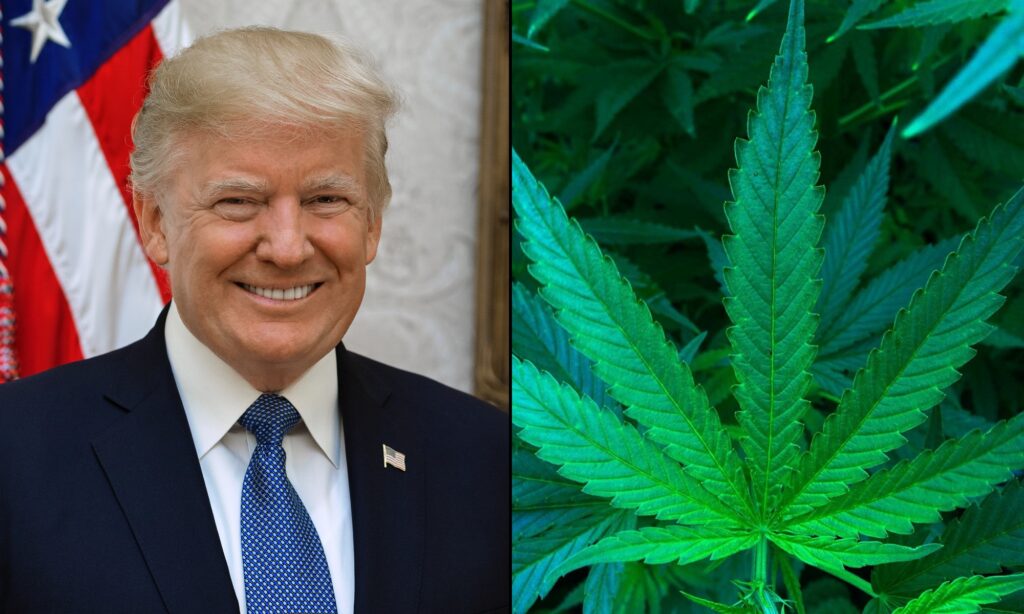Former President Donald Trump says he is starting to “agree a lot more” that people should not be criminalized over marijuana given that it’s “being legalized all over the country”—adding that he will “fairly soon” reveal his position on the cannabis legalization measure on the November ballot in Florida, where he is a voter.
“As we legalize it, I start to agree a lot more because, you know, it’s being legalized all over the country,” Trump said at a press conference at Mar-a-Lago on Thursday. “Florida has something coming up. I’ll be making a statement about that fairly soon.”
A reporter had asked about the Biden-Harris administration push to reschedule cannabis, as well as Vice President Kamala Harris, the 2024 Democratic presidential nominee, stating repeatedly that people should not be incarcerated over simple cannabis offenses.
“As we legalize it throughout the country—whether that’s a good thing or a bad thing—it’s awfully hard to have people all over the jails that are in jail right now for something that’s legal,” Trump replied. “So I think obviously there’s a lot of sentiment to doing that.”
While not an explicit endorsement of major marijuana reform, the statement represents another example of Trump departing from the harsh anti-drug rhetoric he’s been employing over this latest campaign, at least when it comes to marijuana. And while it’s unclear whether he will choose to back the Florida cannabis legalization measure that he will have the chance to vote on as a resident, he did not take the opportunity to denounce it, despite Florida Gov. Ron DeSantis’s (R) campaign against the reform measure.
The candidate also discussed people he’s issued presidential pardons for, including Alice Johnson, who was sentenced to life in prison without the possibility of parole over her role in a cocaine trafficking ring in the 1990s.
He said Johnson is a “fantastic woman” who “served 24 years for being on a phone call having to do with drugs, adding that she “was great” and “had another 24 years to go, and it was largely about marijuana, which, in many cases, is now legalized” at the state level.
Trump seemed confused during an interview last year when he was confronted with the fact that his proposed plan to impose the death penalty on drug traffickers would have condemned Johnson to death.
“I let a lot of people out [of prison] that had no representation. I went to people in jails, in prison, that we respected. I said, ‘How many of these people should be let out?’” Trump said on Thursday. “We let out large groups of low-income people that were serving like 40 years for something that today you wouldn’t even be put in jail for.”
Trump also recently went after Harris over her prosecutorial record on marijuana, claiming that she put “thousands and thousands of Black people in jail” for cannabis offenses—but the full record of her time in office is more nuanced.
Trump’s line of attack, while misleading, was nonetheless notable in the sense that the GOP presidential nominee implied that he disagrees with criminalizing people over marijuana and is moving to leverage the idea that Harris played a role in racially disproportionate mass incarceration.
Meanwhile, Harris selected Minnesota Gov. Tim Walz (D) as her running mate, choosing a candidate who backed numerous cannabis reform measures in Congress, called for an end to prohibition when he was running for governor and then signed a comprehensive legalization bill into law in 2023.
As president, Trump largely stayed true to his position that marijuana laws should be handled at the state-level, with no major crackdown on cannabis programs as some feared after then-Attorney General Jeff Sessions rescinded the Obama era federal enforcement guidance. In fact, Trump criticized the top DOJ official and suggested the move should be reversed.
While he was largely silent on the issue of legalization, he did tentatively endorse a bipartisan bill to codify federal policy respecting states’ rights to legalize.
That said, on several occasions he released signing statements on spending legislation stipulating that he reserved the right to ignore a long-standing rider that prohibits the Justice Department from using its funds to interfere with state-legal medical marijuana programs.
Before President Joe Biden bowed out of the race, his campaign made much of the president’s mass cannabis pardons and rescheduling push, drawing a contrast with the Trump administration’s record. The Harris campaign so far has not spoken to that particular issue, and the presumptive nominee has yet to publicly discuss marijuana policy issues since her own campaign launched.



